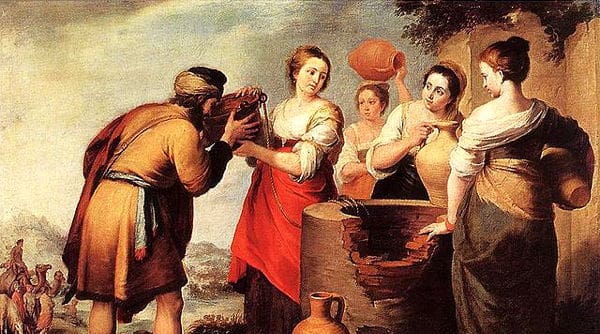If You Only Knew…Saint Teresa and the Waters of Prayer
(Part II of II)
Editor’s Note: In Part I, we looked at how Jesus had gotten the attention of the Samaritan woman when He spoke of living waters, and how St. Teresa of Avila also gets our attention when speaking of the stages of prayer as waters of prayer. Today, we will discuss what those four waters of prayer entail.
Jesus had asked the Samaritan woman to draw water from the well to slake His thirst. Saint Teresa uses this very same example as the first means by which we are to slake our own thirst. Thus the 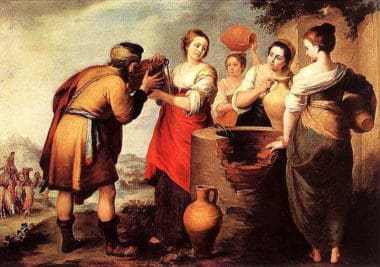 First Water or the first stage of prayer requires considerable exertion on our part – we must draw the water from the well. As she will explain later in the “Interior Castle”, prayer is the means of entry into the Castle. Just as providing enough water to meet our needs will require numberless trips to and from the well, so too our perseverance in prayer will require a parallel in self-denial, cooperation with grace and growth in the practice of the virtues in order to be a true follower of Christ. This ascetical stage corresponds to the first Three Mansions and includes both vocal prayer and meditation. It is the preparatory ground for the Fourth Mansion when God intervenes more directly.
First Water or the first stage of prayer requires considerable exertion on our part – we must draw the water from the well. As she will explain later in the “Interior Castle”, prayer is the means of entry into the Castle. Just as providing enough water to meet our needs will require numberless trips to and from the well, so too our perseverance in prayer will require a parallel in self-denial, cooperation with grace and growth in the practice of the virtues in order to be a true follower of Christ. This ascetical stage corresponds to the first Three Mansions and includes both vocal prayer and meditation. It is the preparatory ground for the Fourth Mansion when God intervenes more directly.
Saint Teresa indicates however that many do not go beyond the Third Mansion. What is accomplished in the first three mansions is what the person in maturing can achieve through human effort accompanied by grace. Having reached this limit there can be a comfort level in what has been achieved and a resistance to further surrender. This is brought out in St. Marks’ account of the “Rich Young Man”.
And as he was setting out on his journey, a man ran up and knelt before him and asked him, “Good Teacher, what must I do to inherit eternal life?” And Jesus said to him, “Why do you call me good? No one is good except God alone. You know the commandments: ‘Do not murder, Do not commit adultery, Do not steal, Do not bear false witness, Do not defraud, Honor your father and mother.’” And he said to him, “Teacher, all these I have kept from my youth.” And Jesus, looking at him, loved him, and said to him, “You lack one thing: go, sell all that you have and give to the poor, and you will have treasure in heaven; and come, follow me.” Disheartened by the saying, he went away sorrowful, for he had great possessions. (Mark 10:17-31)
Jesus was very direct in what He proposed to the young man. Before He invited him into participation of the Gift of Living Water, He pointed him in the right direction, “go, sell all that you have…” Teresa refers to those who make it thus far as earnest souls who have a well-regulated life, are zealous in keeping the commandments and avoiding sin and seeking to advance further in the spiritual life as shown by his question: what must I do to inherit eternal life? Jesus invited him to take the leap of faith by letting go, not only of his material riches but also of those spiritual riches he had zealously acquired through human effort aided by grace. The young man, although obedient to the commandments was not up to this further obedience. Jesus sadly watched him walk away enslaved by his attachments.
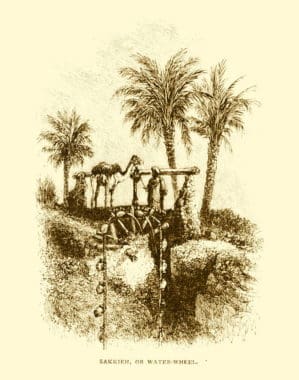 The Second Water, while still strenuous, is not as labor-intensive as the First: the use of a water wheel with dippers attached. As the wheel turns, the dippers pour the water into a trench which in turn carries the water to the garden. Here, in this Fourth Mansion, we touch upon the supernatural, the beginning of infused contemplation, in which the divine light penetrates the understanding, whereas in the “prayer of quiet”, it penetrates the will. Teresa describes this prayer as a bubbling fountain which brings with it a deep sense of peace arising from the deepest recesses of the soul. We cannot strive after this as it is a total gift of God. Our goal is love of God, not consolation nor self-interest. Although God gives this to whomever He wishes we can dispose ourselves through the practice of detachment, humility and obedience. With these dispositions we are becoming conformed to Christ.
The Second Water, while still strenuous, is not as labor-intensive as the First: the use of a water wheel with dippers attached. As the wheel turns, the dippers pour the water into a trench which in turn carries the water to the garden. Here, in this Fourth Mansion, we touch upon the supernatural, the beginning of infused contemplation, in which the divine light penetrates the understanding, whereas in the “prayer of quiet”, it penetrates the will. Teresa describes this prayer as a bubbling fountain which brings with it a deep sense of peace arising from the deepest recesses of the soul. We cannot strive after this as it is a total gift of God. Our goal is love of God, not consolation nor self-interest. Although God gives this to whomever He wishes we can dispose ourselves through the practice of detachment, humility and obedience. With these dispositions we are becoming conformed to Christ.
In the Third Water the Lord Himself takes over the watering of the garden through irrigation. Whereas in the First Water the well could run dry and one would have to wait until it filled up 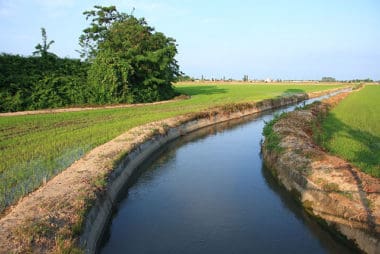 again, in this Third Water the Lord provides an endless stream of water for irrigation. This is the Fifth Mansion in which the Lord enters the center of the soul. In the prayer of simple union the interior faculties of memory and imagination are penetrated with the divine light of the Holy Spirit. As the soul becomes transformed it undergoes a radical detachment from worldly concerns. The garden is becoming lush with blooms. There are different levels or intensifications of this mystical prayer of union. Once the soul has experienced this indwelling it retains a certainty of the experience.
again, in this Third Water the Lord provides an endless stream of water for irrigation. This is the Fifth Mansion in which the Lord enters the center of the soul. In the prayer of simple union the interior faculties of memory and imagination are penetrated with the divine light of the Holy Spirit. As the soul becomes transformed it undergoes a radical detachment from worldly concerns. The garden is becoming lush with blooms. There are different levels or intensifications of this mystical prayer of union. Once the soul has experienced this indwelling it retains a certainty of the experience.
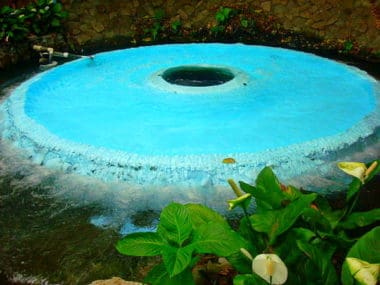 The Fourth Water or the falling of rain on the garden: “…you shall be like a watered garden, like a spring of water, whose waters do not fail” (Isaiah 58:11).
The Fourth Water or the falling of rain on the garden: “…you shall be like a watered garden, like a spring of water, whose waters do not fail” (Isaiah 58:11).
Here in this Sixth Mansion, the Betrothal takes place. The soul may experience extraordinary mystical encounters. As the Holy Spirit takes over and penetrates more deeply into the soul the exterior senses will likewise be affected. The souls that have come thus far will have many trials to undergo before entering the Seventh Mansion, the final stage of mystical contemplation. There is no need here for extraordinary mystical encounters for action and contemplation live in harmonious relationship with each other. Here the spiritual 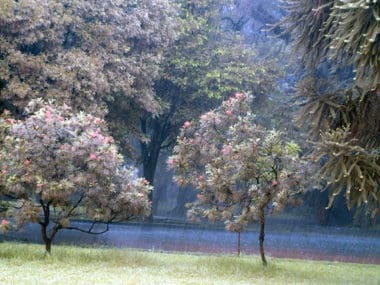 Marriage takes place. Teresa compares the gentle rain that falls into a river as the soul and God that once mingled cannot be separated.
Marriage takes place. Teresa compares the gentle rain that falls into a river as the soul and God that once mingled cannot be separated.
Everyone loves a garden! It is a piece of paradise sometimes found within a drab environment. It reminds us of our first beginnings before the Fall when Adam and Eve walked with God in the cool of the evening in the Garden. George Bernard Shaw once wrote, “The best place to find God is in a garden. You can dig for him there.“ St. Teresa demonstrates how in the first three Mansions we must become the gardener, the laborer who digs, turns the soil, pulls out the weeds, sets the plants, and tugs the rope to draw water for the well. When Jesus sees our intense effort, might He not be prompted to come sit on the edge of the well, ask us for a drink, and then encourage us with the words, ‘If you knew the gift of God’?
Originally published by Carmelite Sisters of the Most Sacred Heart of Los Angeles, used with permission.
Art: Rebecca and Eliezer, Bartolomé Esteban Murillo, circa 1650, PD-US; Sepia of Sakkieh or Water-wheel, G. Pearson (TIMEA), 1890, CCA-SA PD-published before 1923; Il Cavo Cattedrale nei pressi di Vespolate NO (The cable Cathedral near Vespolate NO), Alessandro Vecchi, 2 June 2012, own work, CCA-SA; Ojo de Agua, La Ribera de Belén, Heredia, Costa Rica (“Eye of Water” Natural Spring at La Ribera de Belén, Heredia, Costa Rica), Victor Quirós A., 17 March 2012 own work, CCA-SA; Pluie de printemps/Chuva de primavera (Spring Rain), Sergio Valle Duarte, 22 November 2008, CCA; all Wikimedia Commons.



